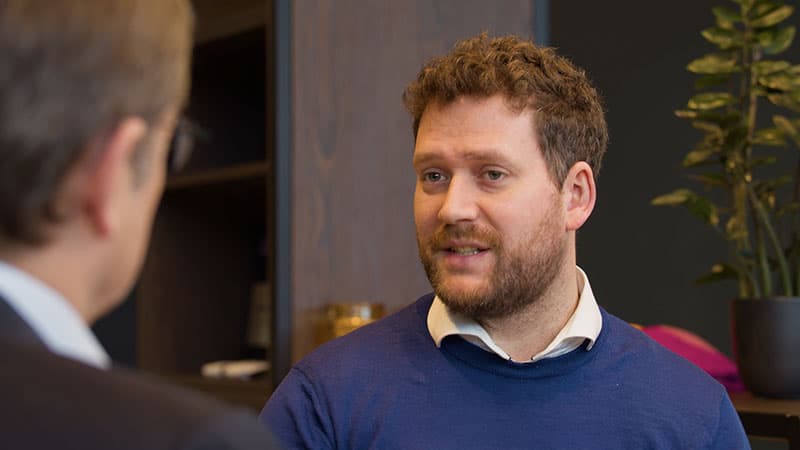Sustainability and profit: how to combine them successfully
Professors Xavier Baeten and Robert Boute advise merchandise company Sunday on how to balance profit and sustainability

By Xavier Baeten
Professor of Reward & Sustainability

By Robert Boute
Professor of Operations Management
Sustainability is critical for the future, but how can you put it into practice without sacrificing profit? Niels Vandecasteele and Steven Callens of Sunday, a company that makes sustainable merchandise for companies, are among those struggling with this issue. The experts at Vlerick Business School offer some advice.
Not traditional merchandise, but high-quality, personalised clothing and gadgets that people use with pride. This is what Sunday, the company launched by Niels Vandecasteele and Steven Callens, set out to create. They produce all their products sustainably but feel they are pushing the limits. Time to take a closer look at their sustainability policy.
Sustainability must not stand in the way of profit
It’s a challenge that many entrepreneurs struggle with: how do you make your products and entire production chain as sustainable as possible, without losing out on profits? “This will be a major challenge, especially in the future. Although production costs are continuing to rise, the prices of our products can’t rise accordingly,” says Niels Vandecasteele, co-founder of Sunday.
Sustainability is a balancing act
One of the major challenges for Sunday: how can you work as sustainably as possible while making enough profit? Professor Xavier Baeten advises them to focus on the DNA of their company.
“We try to make the product as sustainable as possible. The European Union already imposes various requirements in the Supply Chain Act that seem obvious to us, from clean raw materials to sustainable and even natural dyes and recycled materials. They also include the CO2 emissions of the production process and the social aspect of sustainability: fair wages for people who work on our products.”
Sunday takes things even further: if a company in the maritime sector wants merchandise for its employees, Niels and Steven also consider recycled materials from boat sails or discarded fishing nets, for example.
They don't just impose these conditions on themselves out of conviction. “Doing this helps us to stand out from the fast-fashion market that prints sweaters on a large scale in Asian countries with cheap materials, bad dyes and in terrible working conditions.”
Vlerick’s advice “Sustainability is a complex issue that many entrepreneurs struggle with,” explains Xavier Baeten, Professor of Reward & Sustainability at Vlerick Business School. “Sustainability must not stand in the way of profit. You can't do everything, so it's important to focus on economically feasible sustainability.” How can you do this? “The European Union imposes various minimum conditions when it comes to sustainable materials, products and dyes, but also fair wages for everyone in the chain. It’s best to summarise all the measures you take in a clear list. Communicate this transparently to all your stakeholders based on figures and data.” What if you go beyond the minimum requirements? “Make sure you also list these things and go through them with a critical eye. Make choices, because you can't do everything and stay economically healthy. Sustainable production will still be a USP (Unique Selling Proposition), but this allows you to be transparent about what you are tackling without putting all that pressure on yourself to do absolutely everything.” Conclusion
|
The more international, the more complex the supply chain gets
There is also the challenge of a complex supply chain. “We currently produce our clothes in Europe, where the rules are fairly strict,” explains Steven Callens, co-founder of Sunday. “For years, we've been working with a partner who is very transparent about how the clothing is produced.”
Sunday's customer base is becoming more international. “We are seeing demand from foreign companies grow and this will only increase in the future. If we sell products in Taiwan, for example, it isn’t logical or sustainable for the clothes to be produced in Portugal and then transported all the way to the other side of the world. In such cases, you have to work with local producers who may not be as committed to sustainability.”
Vlerick’s advice “Unfortunately, there is no ready-made answer that can solve the issue of a complex supply chain all in one go,” says Robert Boute, Professor of Operations Management at Vlerick Business School. He specialises in supply chain management. “The more international customers you have, the more complicated it gets.” What you should definitely not do, however, is make ad hoc decisions. “The fact that your customers are in Asia doesn’t necessarily mean you should rush into relocating your production to avoid polluting forms of transport,” continues the professor. So what should you do? “It’s perfectly okay for your production system to stay in Portugal, where you can be sure that the conditions meet your sustainability requirements. But you can make the transport to intercontinental customers more sustainable.” Specifically, this can be done by opting for alternative transport methods. “Avoid planes, one of the most polluting transport options. Consider electric trucks or freight trains, for example. Customers will have to wait longer for their products, but as long as you’ve incorporated that into your plan it can't do any harm.” “If demand is growing exponentially in certain regions, then you can investigate whether a local production partner would be an option. Take the time to check whether they meet your sustainability requirements so you can enter into a long-term relationship of trust.” Conclusion
|
Ready to grow your company? Managing a fast-growing company is a challenging task that demands an enormous amount of knowledge and time. Skip the trial-and-error stage with our Scale-Up Masterclass. This unique learning experience will help you prepare to leap into the fast-paced world of high-growth scale-ups and will have a long-term impact on your company, yourself and your team.
Get in touch!




